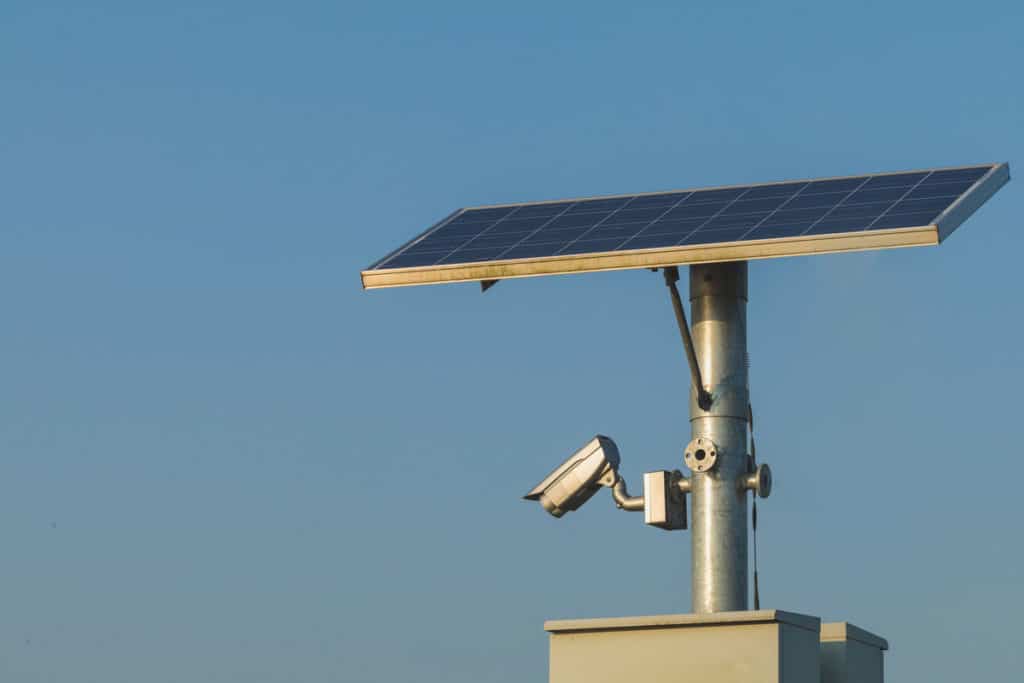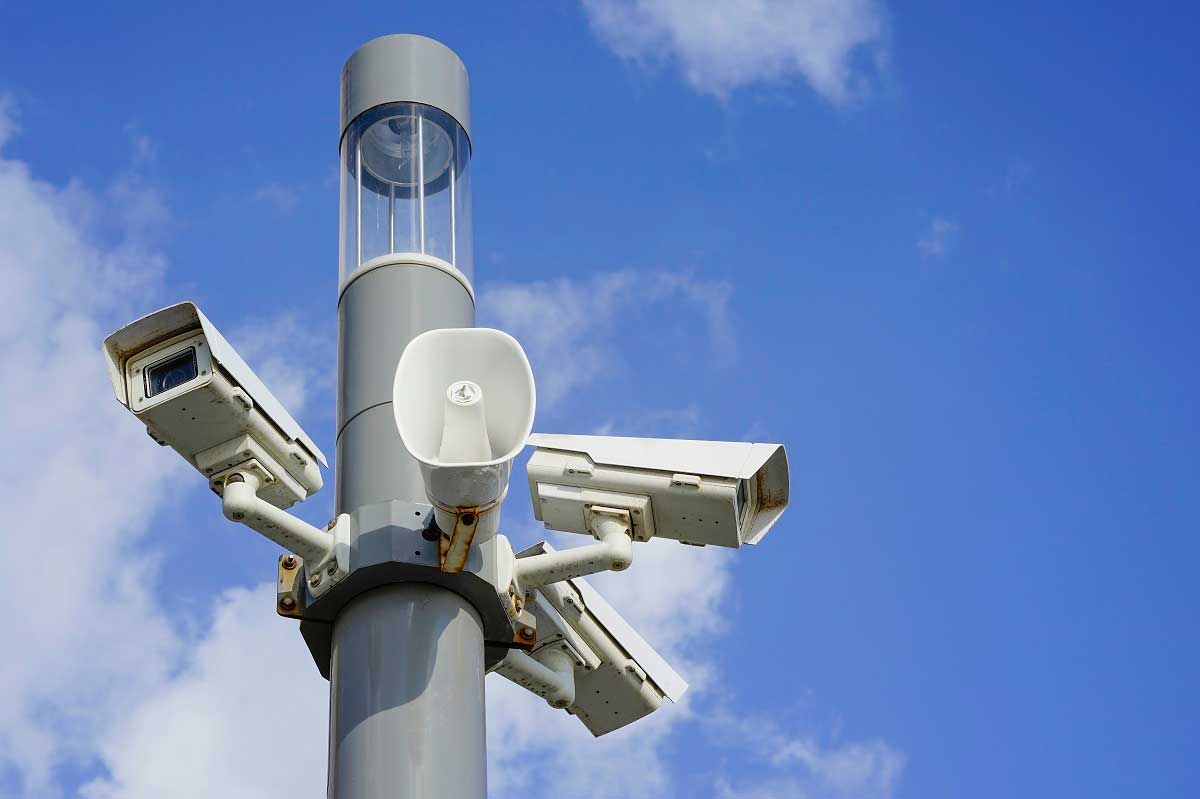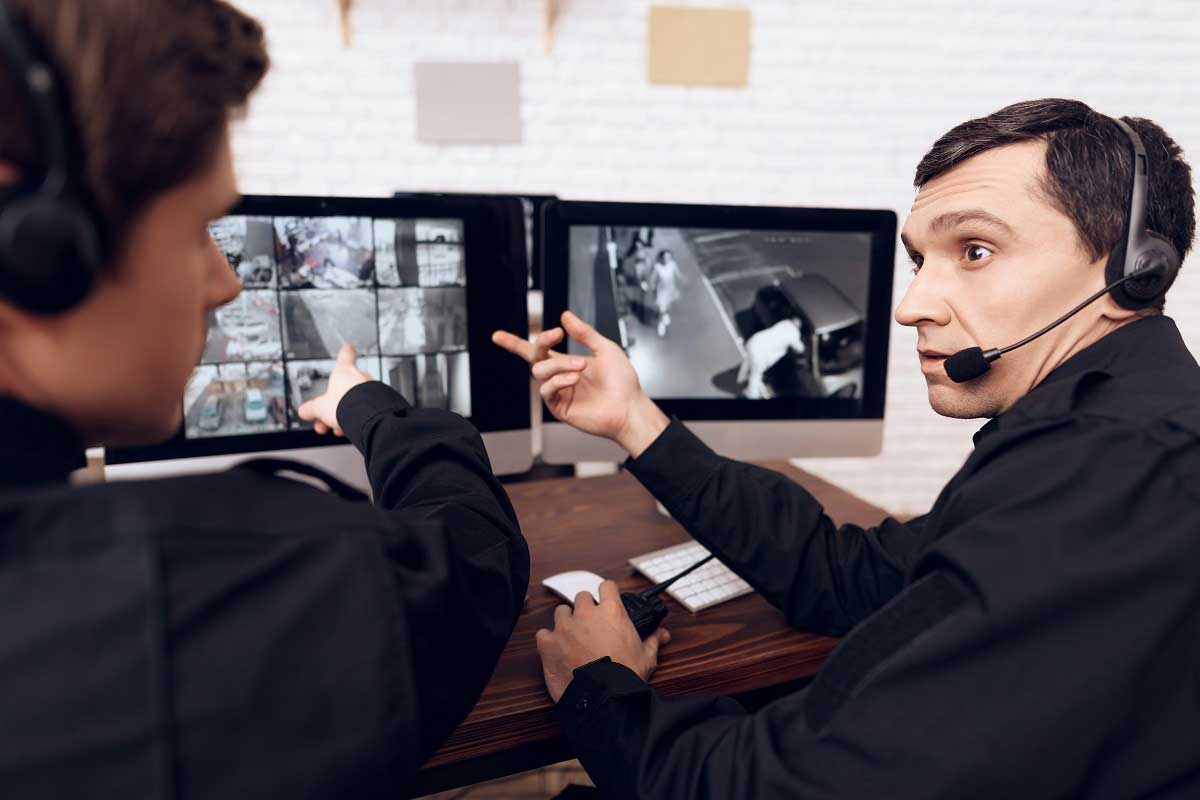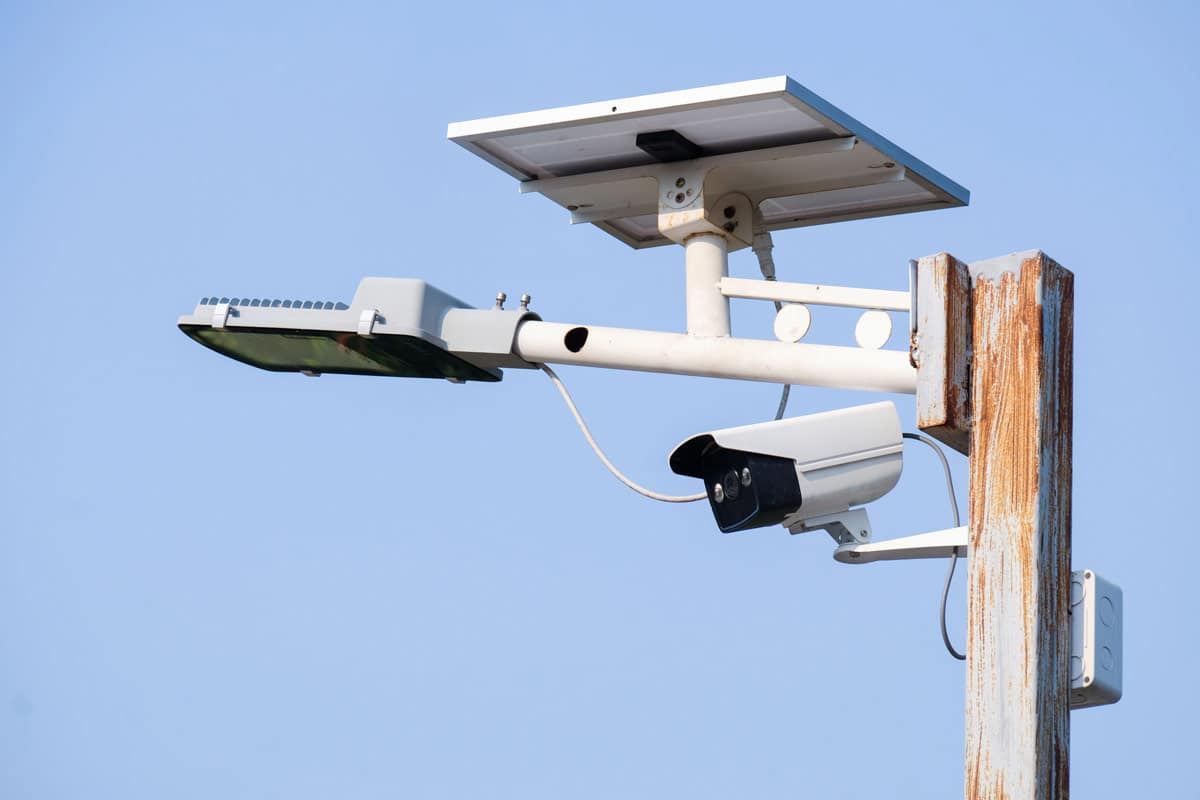Digital technology impacts nearly every tool and every business, including the securities industry. Solar power is equally impactful, and the push to generate other planet-friendly tools is ongoing. Sometimes these solutions combine to broaden the confines of an established industry.
Consider the power of digital IP technology coupled with a solar powered security camera. Together, these innovative tools keep businesses safe all around the globe.
Is there an application in your business that’s right for a solar powered security camera connected to the internet?
Here’s what to look for and what to know about these tools.
What are Solar Powered IP Cameras?
Solar-powered IP cameras are surveillance cameras that use solar energy as their primary power source instead of relying on traditional electrical outlets or batteries. These cameras come equipped with photovoltaic panels that capture sunlight and convert it into electrical energy to power the camera’s operations.
Internet Protocol (IP) cameras are digital video cameras that transmit data over a network, such as the internet. They are commonly used today for surveillance and security purposes. Solar-powered IP cameras typically incorporate wireless connectivity, allowing them to send video footage and other data to a central monitoring system or directly to the user’s device, such as a smartphone or computer.
Applications for Solar Powered IP Cameras
A solar powered IP camera is often installed in locations where it is difficult or impractical to run power cables, such as remote areas, outdoor spaces, or areas without access to electricity. They offer a cost-effective and environmentally friendly solution for continuous surveillance in areas with ample sunlight. Additionally, some solar-powered IP cameras are designed with energy-efficient features to maximize battery life during periods of low sunlight or inclement weather.
One common application is for remote (and geographically challenging) locations, which may not have access to electricity and Wi-Fi, but they still need the same security benefits. In fact, these locations are even harder to secure since they don’t have this access — and thieves know that. Construction sites, ranch and agricultural locations, and gas or oil pipelines are three examples where solar powered security cameras could come in handy.
Fortunately, solar panels offer a supply of energy for surveillance tools, which makes securing the site possible. Each solar security camera unit typically has a rechargeable battery that the camera can draw from. On even the cloudiest days, these sophisticated tools can still draw power from the visible light through the clouds.
Solar camera security is a low-cost but high-return option for companies seeking off-grid security. These cameras typically make use of 4G or 5G networks to transmit video images to the property owner or security team. Alternatively, the cameras can simply record information on an SD card for playback later if no Wi-Fi is available.
What Type of Solar Powered IP Camera is Right for Your Business?
Before selecting your security camera, would you prefer a static analog image, or a real-time video stream that transmits over the Internet? There are two key differences between these options:
-
Analog: Security cameras record images and store it on a DVR for later playback.
-
Real-time: This is where IP security cameras shine. They send their signals over the Internet for immediate viewing or recording.
IP security cameras offer several benefits that older analog systems can’t. For example, the best IP camera systems offer:
-
Higher resolution, which allows for zooming into an image with less blur and more viewing clarity.
-
Key events can be highlighted or flagged based on the parameters you set. Motion detection, camera tampering, or other flagged events can be carved out from standard viewing. With an analog system, you would have to play through all the footage until you find what you need.
-
You can view the video on any digital device with an Internet connection.
-
IP cameras have a better viewing field, which reduces the number of cameras you need.
-
If you have multiple IP cameras, you can set up a network video recorder (NVR) to view a dashboard of all your recordings (both video and audio) in one place.
-
You can add analytics software tools that monitor the footage as it’s being recorded and automate your response. For example, motion detection allows the system to capture and analyze motion in a certain area of your business. The software can notify you or it can set off an alarm or perform another function automatically.
The benefits of the best IP camera systems are clear, which is why many companies are upgrading their current security platforms.
Solar Powered IP Camera Benefits
However, how do these features, in practice, keep your business safe? First, let’s talk about the benefits of solar powered security cameras, and then we’ll discuss how IP cameras change the game entirely.
Benefits of Solar Powered Security Cameras
-
Cost-effective: Solar-powered cameras eliminate the need for electrical wiring and ongoing electricity costs, making these projects less expensive.
-
Environmentally friendly: These cameras reduce reliance on fossil fuels and help decrease carbon emissions.
-
Remote monitoring: Solar-powered cameras often come with wireless connectivity, allowing for remote monitoring via smartphones, tablets, or computers.
-
Versatility: Solar-powered cameras are versatile and can be deployed in various outdoor locations where electrical access may be limited.
-
Low maintenance: Once installed, solar-powered cameras require minimal maintenance, with routine cleaning of solar panels being the primary upkeep task.
Next, let’s look at the benefits of video security cameras that use the Internet to watch your property in real time.
Benefits of IP Security Cameras
-
High-quality video: IP cameras capture high-definition video footage, providing clear and detailed images that allow for better identification of people, objects, and events.
-
Scalability: IP camera systems are highly scalable, allowing users to add additional cameras to their network as needed without significant infrastructure changes.
-
Flexible installation: IP cameras can install by using wired Ethernet connections or wireless Wi-Fi networks, offering flexibility in your deployment options. Depending on the security requirements, they can be placed indoors or outdoors.
-
Advanced features: IP cameras often come with advanced features such as motion detection, night vision, two-way audio, pan-tilt-zoom (PTZ) capabilities, and intelligent video analytics, enhancing their surveillance capabilities.
-
Integration: IP cameras can integrate with other security systems, such as access control systems, alarms, and video management software, creating a comprehensive security ecosystem.
-
Higher reliability: IP camera systems are less susceptible to interference and signal degradation when compared to analog systems, resulting in more reliable video transmission and recording.
Choosing a Solar Powered IP Security Camera
Imagine a fully automated, real-time, HD video and audio system that doesn’t depend on electricity. Now consider the ability to view and monitor your property from your cell phone.
These tools are rugged and suitable for the most geographically challenging environments and can serve as both free-standing units and off-grid backups.
The benefits of solar-powered IP cameras are real-time monitoring of remote locations, the ability to automate functions with “smart” software, and a green solution that isn’t dependent on the power grid.
With all the choices for video cameras available today, choosing one that’s right for your business is incredibly challenging. If you’re a property owner of a large car lot, for example, will the same type of security cameras work across the business, or should you tailor your camera features for the specific challenges of the location where it’s placed? Looking at options for features is particularly difficult. Modern cameras can come with tons of special features: eco-friendly, solar options, IP-driven. There are artificial intelligence (AI) features or even remote 24/7/365 monitoring that could eliminate your reliance on live guards.
Good questions to ask your video surveillance company include:
-
What is the camera's resolution?
-
Does it have night vision capabilities?
-
Does it have motion detection and alerts?
-
What is the battery capacity and how long does it last?
-
What connectivity options does it offer?
-
Is it weatherproof?
-
What are the installation requirements (and what does that add to the cost)?
-
Are these cameras compatible with my existing security system?
-
What are the warranty and support options?
Each of these features we’ve covered are greatly beneficial, depending on your business, in part because you can access surveillance video on any digital device (with a WiFi connection.)
Pro-Vigil for Solar Powered IP Cameras
Pro-Vigil is one of the most trusted names in business security in the United States, with more than 18,000 cameras deployed across 2,500 locations on any given day. We offer a variety of solutions, including solar powered IP security cameras to keep your company safe. Our teams are experts in helping you find the solution that works best for your business.
Talk with our team about the next generation of solar powered IP cameras designed to mitigate your risk no matter the size of your business or where it’s located.
Q&A
Generally, well-maintained solar-powered cameras can last several years, with some high-quality models lasting up to 5-10 years or more.
The lifespan of solar-powered cameras can vary depending on several factors:
- Quality of components: Higher-quality solar panels, batteries, and camera components generally have longer lifespans than lower-quality counterparts.
- Environmental conditions: Exposure to extreme temperatures, humidity, and other environmental factors can affect the camera's longevity and its components.
- Maintenance: Regular maintenance that includes cleaning the solar panels and ensuring proper alignment for optimal sunlight exposure can extend the lifespan of solar-powered cameras.
- Battery capacity and health: The capacity and health of the rechargeable batteries used in the camera play a significant role in determining how long the camera can operate without sunlight. Over time, the battery capacity may degrade, affecting the camera's overall performance.
- Sunlight availability: The availability of sunlight in the camera's location directly impacts its ability to recharge its batteries. Areas with consistent sunlight will typically have cameras with longer lifespans compared to areas with less sunlight.
Yes, IP cameras can work without an internet connection. While these cameras are designed to transmit data over a network, such as the internet, they can still function in a standalone mode or within a local network without internet access.
Here are a few scenarios in which IP cameras can operate without internet connectivity:
- Local network: IP cameras can be set up within a local network, such as a closed-circuit television (CCTV) system, where they communicate directly with a network video recorder (NVR) or a local computer/server. In this setup, the cameras and the recording/storage device are connected to the same network switch or router, allowing for local video surveillance without internet access.
- Direct connection: Some IP cameras are designed to connect directly to a computer or mobile device via a local Wi-Fi network without needing internet access. Users can access the camera's live feed or recorded footage within the same local network.
- Offline recording: Many IP cameras come with onboard storage options, such as a built-in SD card slot or network-attached storage (NAS) support. These cameras can record video footage locally, even when they are not connected to the internet. Users can later access the recorded footage directly from the camera or via the local network.
- Limited functionality: Without internet connectivity, certain features of IP cameras, such as remote viewing and cloud-based storage, will not be available. However, the basic surveillance functions, including live monitoring and local recording, can still be operational.










